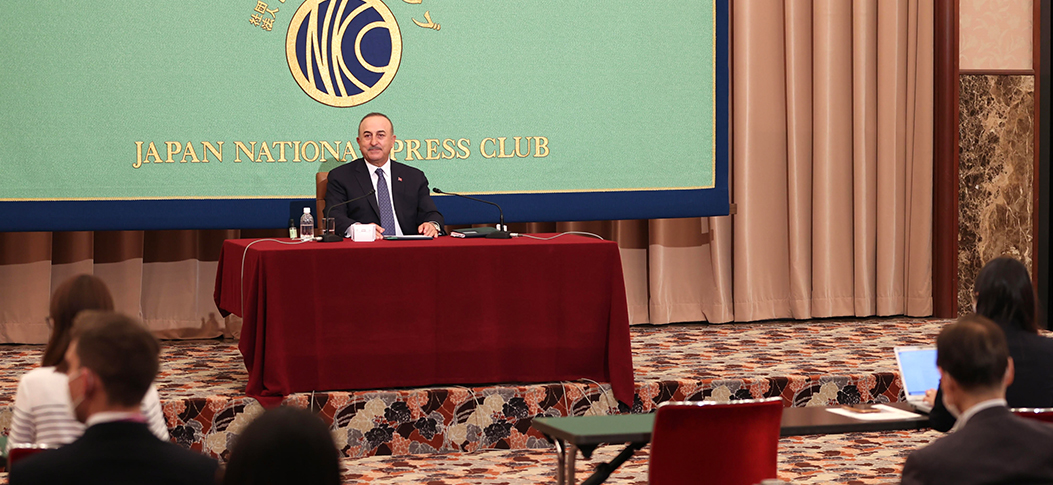"Türkiye's ability to speak to both East and West is an important value,"

Foreign Minister Mevlüt Çavuşoğlu attends a news conference at the Japan National Press Club in the capital Tokyo.
"The revival of Asia has changed the global balance. Pandemics, climate change, migration, terrorism, and energy and food crises are the common problems of humanity. Unfortunately, the current international system fails to respond to these," Mevlut Cavusoglu told.
The current system paves way for competition rather than solidarity, Cavusoglu stressed, and said such competition was evident during the COVID-19 pandemic, as well as in the migration issue.
"In such eras, global actors need to assume common sense, dialogue, and diplomacy," he said, adding that Türkiye follows such foreign policy actively.
In issues related to Ukraine, Bosnia and Herzegovina, the Caucasus, Libya, and Syria, Ankara has carried on an active policy bearing results in favor of the entire world, according to the Turkish minister.
Both soft and hard power must be used in the face of crises, Cavusoglu noted, saying the ability to "speak to both East and West is an important asset for us. As a NATO member and a candidate for the EU membership, we have been one of the few actors who could manage to have active relations with Russia (amid Moscow's war on Ukraine)."
Placing emphasis on Türkiye's balanced policy in its relations with both Russia and Ukraine, Cavusoglu said his country's stance was "principled."
"We advocate international law, a rules-based order. We've implemented Montreux (Convention on Turkish Straits) to the point. Türkiye was the first country to recognize this aggression as a war (on Ukraine) and we've made it clear that we don't recognize it, and we reject it. In other words, we follow a policy that is both balanced and principled," he said.
This July, Türkiye, the UN, Russia, and Ukraine signed an agreement to resume grain exports from three Ukrainian Black Sea ports after they were paused when the Russia-Ukraine war began in February.
A Joint Coordination Center with officials from the three countries and the UN was set up in Istanbul to oversee the shipments.
Cavusoglu said that since the first vessel sailed under the deal on Aug. 1, more than 230 ships have carried over 5 million tons of agricultural products through the grain corridor.
On Türkiye-Japan relations, Cavusoglu hailed the longstanding bilateral ties, affirming his country's readiness to further strengthen Ankara's strategic partnership with Tokyo.
"We see great potential in areas like the defense industry, energy, science, and technology," he added.
He also affirmed Türkiye's willingness to meet Tokyo's needs for UAVs or other defense products.
"We care about Japan's security and stability. We appreciate Japan's contribution to world peace," he noted.
Noting that regional developments directly affected Japan's security, Cavusoglu said: "We're aware that there are threats to Japan's security. We're also disturbed by North Korea's missile tests. Therefore, it is the natural right of Japan to take measures regarding its own security."
Cavusoglu arrived in Tokyo late Sunday to attend the State Funeral for late Prime Minister Abe Shinzo.
Japan is holding a state funeral for Abe, who was assassinated in early July while delivering an election campaign speech in the western Nara city.
Security agencies have been put on high alert as over 18,000 police personnel will guard the venue set up in a park near the Nippon Budokan Hall in Tokyo, where more than 30 foreign dignitaries will pay tributes to the former leader of the ruling Liberal Democratic Party, known for stabilizing the Japanese political arena.
US Vice President Kamala Harris, prime ministers of Australia, India, South Korea, and Cambodia, and International Olympic Committee President Thomas Bach are among the foreign guests.
The event, incurring around 1.66 billion yen ($11.6 million) in costs paid from taxpayers’ money, has received huge criticism from the public and politicians.
Separately, Cavusoglu held a closed-door meeting with his Japanese counterpart Hayashi Yoshimasa and discussed bilateral relations, Ukraine, and other regional developments, the Turkish foreign minister tweeted.

